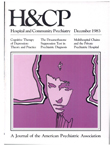Cognitive Therapy of Depression: Theory and Practice
Abstract
Cognitive therapy is based on the premise that cognition, the process of acquiring knowledge and forming beliefs, is a primary determinant of mood and behavior. After reviewing the basic theories of cognitive therapy, the authors discuss its application to the treatment of depression. They theorize that cognitive therapy can improve depressive mood and behavior by focusing on the depressed patient's cognitive disorder. This disorder includes impaired learning and memory function and a systematic negative bias in thinking. The authors note the encouraging results of preliminary outcome studies of this new treatment of depression; such results, they conclude, warrant further development and testing of cognitive therapy.
Access content
To read the fulltext, please use one of the options below to sign in or purchase access.- Personal login
- Institutional Login
- Sign in via OpenAthens
- Register for access
-
Please login/register if you wish to pair your device and check access availability.
Not a subscriber?
PsychiatryOnline subscription options offer access to the DSM-5 library, books, journals, CME, and patient resources. This all-in-one virtual library provides psychiatrists and mental health professionals with key resources for diagnosis, treatment, research, and professional development.
Need more help? PsychiatryOnline Customer Service may be reached by emailing [email protected] or by calling 800-368-5777 (in the U.S.) or 703-907-7322 (outside the U.S.).



